Key takeaways:
- Last-minute changes often reveal hidden strengths and problem-solving skills, encouraging adaptability and resilience.
- Effective communication under pressure is crucial; clarity, active listening, and a calm demeanor foster a supportive environment.
- Flexibility in strategies allows teams to quickly adjust to unexpected challenges, promoting creativity and collaboration.
- Reflecting on experiences with change leads to personal and team growth, highlighting the importance of adaptability as a valuable tool.

Understanding Last-Minute Changes
Last-minute changes can feel like a punch to the gut, can’t they? I remember a time when a major presentation I had prepared for weeks was suddenly rescheduled for an earlier time. The initial shock left me anxious and scrambling, but it also taught me the value of adaptability and quick thinking.
Often, these abrupt shifts in plans arise from circumstances beyond our control, like a sudden decision from a client or a surprise occurrence. Reflecting on my experience, I’ve realized that while these surprises can be daunting, they often bring out a stronger version of ourselves. Have you ever found that last-minute changes push you to rise to the occasion? They can reveal strengths and problem-solving skills we didn’t know we had.
Understanding the root causes of these changes can also help in managing our reactions. I’ve learned to ask myself what I can control in the situation, which often helps bring clarity to the chaos. When something unexpected happens, does panicking really solve the problem? More often than not, taking a step back and regrouping has proven to be the best approach for me.
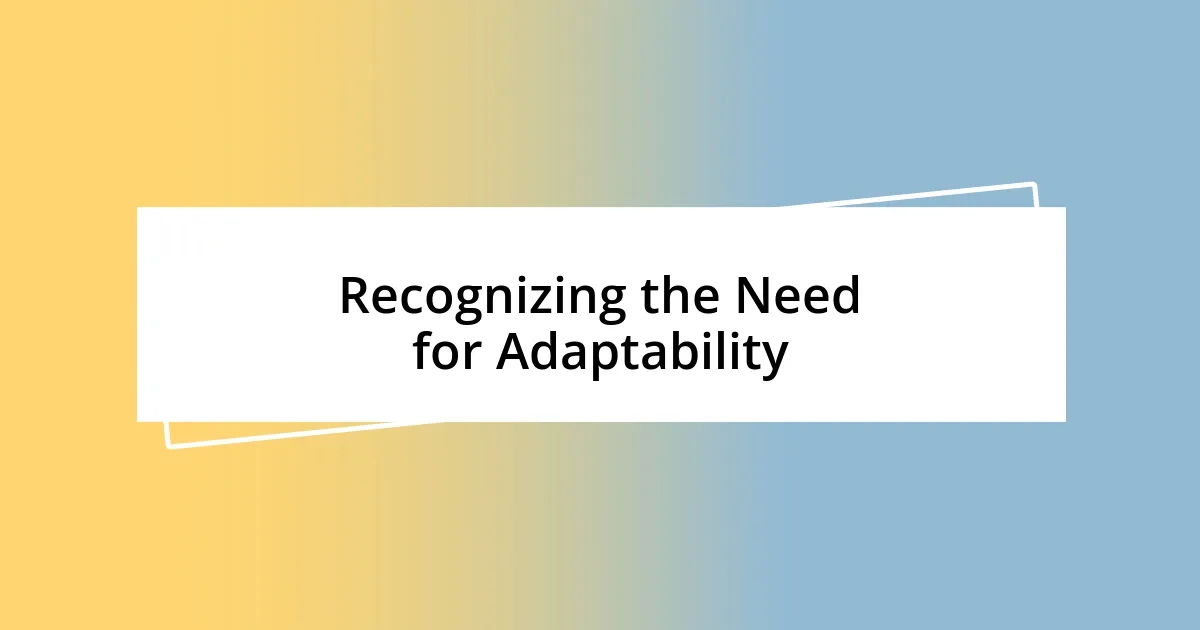
Recognizing the Need for Adaptability
Recognizing the need for adaptability often starts with a shift in mindset. I distinctly recall planning a team project when the lead suddenly quit. At that moment, it felt like the ground beneath my feet had vanished. Instead of dwelling on the setback, I shifted my focus to what could be salvaged. Embracing adaptability allowed me to rally the team and redefine our roles, ultimately leading to a stronger collaboration than before.
It’s fascinating how adaptability often reveals itself in unexpected scenarios. I once had a carefully laid-out travel itinerary disrupted by a storm. Instead of seeing it as a disaster, I decided to explore local options. This unplanned adventure not only expanded my perspective but also deepened my appreciation for spontaneity. Recognizing these moments as opportunities can transform stress into creativity.
We often underestimate our capacity for change and growth. Each experience of adapting teaches us valuable lessons about resilience. Whenever I face a sudden alteration in plans now, I recall how those instances have led me to new paths and unforeseen opportunities. Have you considered how your own adaptability has shaped your experiences? The ability to pivot not only eases the pressure but opens doors we may not have noticed otherwise.
| Initial Reaction | Adaptive Response |
|---|---|
| Shock and Anxiety | Opportunity for Growth |
| Resistance to Change | Embracing Flexibility |
| Panic | Problem-Solving Mindset |
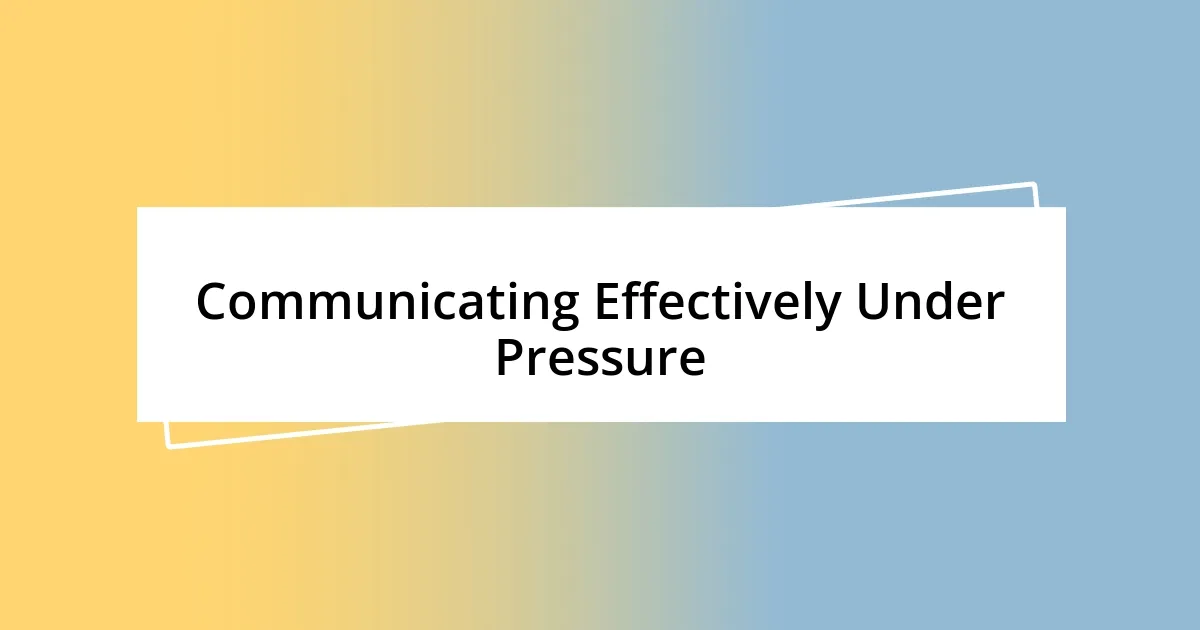
Communicating Effectively Under Pressure
When communicating under pressure, I’ve found that clarity is crucial. During a project crisis, I noticed that my team started to feel overwhelmed and unsure about their roles. To address this, I gathered everyone for a quick meeting. We shared updates and concerns, and I aimed to keep the conversation focused and positive. This openness not only eased tension but also fostered a supportive environment where everyone felt heard.
In moments of high pressure, several strategies can enhance effective communication:
- Stay calm: Your demeanor influences how others react. I’ve learned that maintaining a level head sets the tone for the entire team.
- Prioritize key messages: Focus on the essentials. I always clarify the most critical tasks to streamline discussions.
- Listen actively: I make it a point to encourage team members to voice their thoughts. Sometimes, the best solutions arise from their insights.
- Be assertive, not aggressive: It’s important to express needs firmly but respectfully, fostering collaboration rather than conflict.
I recall a time when a last-minute client request sent us into a tailspin just hours before delivery. As panic began to pervade our workspace, I decided to shift gears and hold an urgent brainstorming session. I encouraged everyone to voice their ideas, no matter how unconventional. This approach not only sparked creativity but also increased team morale. We ended up with a solution that met the client’s expectations while also allowing us to maintain our sanity.
Effective communication during these tight timelines is more than just a skill; it’s a lifeline. Each experience with pressure sharpens my understanding of how vital it is to keep the lines of communication open. When I look back, those chaotic moments often led to innovative breakthroughs I wouldn’t have imagined in a more relaxed setting. It’s a reminder that pressure can indeed yield diamonds.
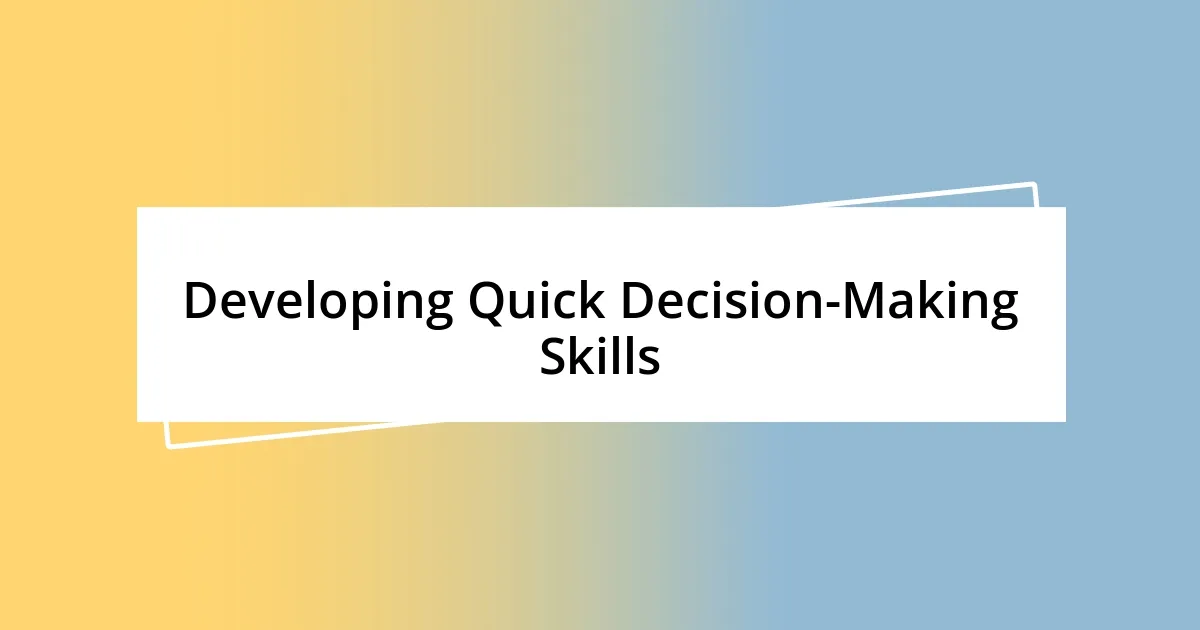
Developing Quick Decision-Making Skills
Making quick decisions is a skill I’ve honed over time, especially in unexpected circumstances. I remember a time when a major presentation came back from review with significant changes only hours before we were set to go live. My heart raced, but I quickly gathered my thoughts. Instead of panicking, I identified the most critical revisions. This focus allowed me to streamline my response and keep the team motivated—proving that a clear mind can lead to effective solutions even under pressure.
One thing I’ve learned is that quick decision-making often relies on past experiences. For instance, when a colleague unexpectedly dropped out of a project, I had to quickly reassess our workload. Drawing on what I knew about each team member’s strengths, I reassigned tasks in a way that played to their individual skills. This not only alleviated immediate stress but also reinforced trust within the team. Have you ever found yourself in a similar position where leveraging your team’s strengths led to a more favorable outcome?
Oftentimes, the most challenging decisions are the ones that push us to think creatively. I once had a budding idea for a marketing campaign that was shut down at the last minute. Rather than letting that setback discourage me, I pivoted and proposed a completely new direction. This quick turnaround wasn’t easy, but it sparked a collaborative brainstorming session that ultimately led to a campaign that exceeded our original vision. It makes me wonder: how often do we underestimate our ability to innovate when faced with challenges? Each moment of crisis holds the potential for unexpected opportunities if we’re ready to seize them.
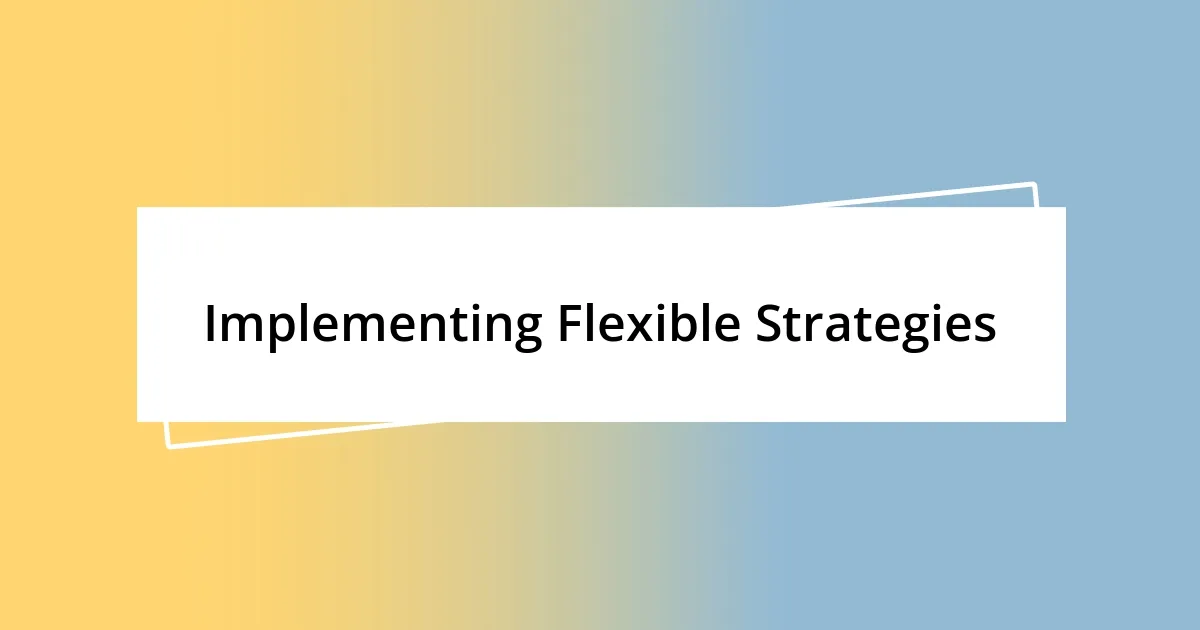
Implementing Flexible Strategies
When it comes to implementing flexible strategies, adaptability is key. I remember a project where a pivotal team member fell ill just days before a crucial deadline. Instead of succumbing to stress, we conducted a quick team assessment to see who could cover the gaps. Surprisingly, several team members stepped up, eager to take on new roles. This experience taught me that fostering a culture of flexibility empowers the entire team to rise to the occasion.
Sometimes, flexibility isn’t just about rearranging tasks; it’s about altering our mindset. A few months ago, we faced a sudden shift in our project requirements due to client feedback that felt overwhelming at first. I suggested we carve out time for an agile review process, where we could adjust our strategies without losing sight of our goals. By embracing this approach, we not only adapted quickly but also nurtured creativity. Have you ever noticed how a little open-mindedness can transform a chaotic situation into an opportunity for innovation? I certainly did.
A personal lesson in flexibility came when I realized that plans can change at a moment’s notice. During one intense planning session, we discovered we had left out a key stakeholder’s input. Rather than panicking, we quickly invited them to a brainstorming session to gather their insights. This not only improved the final output but also reinforced the importance of inclusivity in our process. It’s fascinating how a simple pivot like that can lead to richer collaboration and a more successful outcome. Isn’t it inspiring to think about how small adjustments can yield significant results?
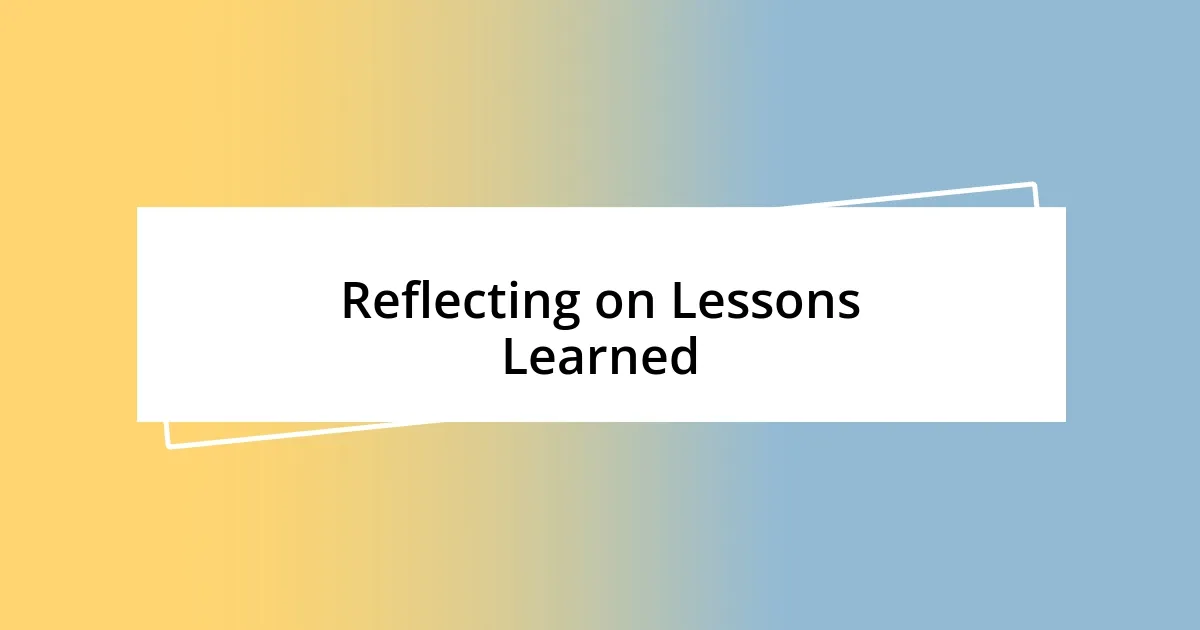
Reflecting on Lessons Learned
Reflecting on lessons learned can be a transformative experience. I recall a time when an unexpected change derailed my established plans. The sinking feeling was immediate, but it forced me to reevaluate my priorities. By embracing the disruption, I realized it was an opportunity to reassess how I approach challenges, which ultimately strengthened my resilience.
There’s something poignant about recognizing that change often teaches us more than stability ever could. I remember a scenario where we had to overhaul an entire strategy at the last minute due to unforeseen circumstances. Initially, it felt like a setback, but once we regrouped and shared our ideas openly, I was amazed at how our creativity flourished. Have you ever thought about how adversity could be the catalyst for your best work? It truly made me appreciate the uncharted territories of innovation lying just beyond our comfort zones.
Through these experiences, I’ve come to understand that reflecting on how we handle last-minute changes isn’t just about the immediate solution; it’s about recognizing the growth that comes from it. Each time I’ve navigated a surprise alteration, I’ve gained not just new skills but also deeper relationships with my team. Isn’t it interesting how vulnerability can bring us closer and foster a richer dialogue? The lessons I’ve learned continuously shape my perspective, reminding me that adaptability is not just a necessity; it’s a powerful tool for growth.














